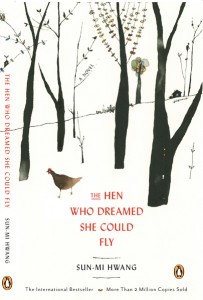 Begin a story with a spinster, nearly psychotic, deluded, clearly suicidal chicken. Try to kill her, but let her escape a genocidal murder attempt. Then, have the chicken get involved with someone not only from another culture, but from a different species. Then, kill off that character. Have the chicken raise an orphan from another species, that the chicken doesn’t even initially recognize as from another species. Have the chicken attempt to return to her community, but be rebuffed as a threat and weirdo. Finally, let the suicidal chicken attain her desire to be killed as her non-child flies off into an orphaned and uncertain future.
Begin a story with a spinster, nearly psychotic, deluded, clearly suicidal chicken. Try to kill her, but let her escape a genocidal murder attempt. Then, have the chicken get involved with someone not only from another culture, but from a different species. Then, kill off that character. Have the chicken raise an orphan from another species, that the chicken doesn’t even initially recognize as from another species. Have the chicken attempt to return to her community, but be rebuffed as a threat and weirdo. Finally, let the suicidal chicken attain her desire to be killed as her non-child flies off into an orphaned and uncertain future.
The end.
That, my friends, is a “children’s book” in Korea.^^
That is also only on one interpretation of The Hen Who Dreamed She Could Fly by Hwang Sun-mi (you can see a youtube interview with her, in English and Korean here). And it’s the one I stand by. Sort of.^^ Actually, it’s a brilliant fable of a factory worker (egg-producing chicken) who dreams of, and finally achieves a limited kind of freedom by escaping her madang (barnyard, really.. the Korean title 마당을 나온 암탉 really kind of means, “The Hen who wanted to escape from the (barn) yard”) and eking out, for a while at least, an independent life, and one in which she can accomplish the one task she has really always wanted to accomplish, be a good mother.
While it’s a children’s story, it is written at a fairly sophisticated level and also works as a metaphorical plea for self-determination and motherhood (love of motherhood has always been the rage in Korean modern literature). What is surprising in this story is WHO the hen becomes a mother to. Like Charlotte’s Web, The Hen uses animals to represent human conditions and attitudes, and under its semi-feel-good story, is actually a kind of complaint/commentary on social expectations. Many reviews, including the “official” one on Amazon, refer to this work as “world literature” but that is an arbitrary taxonomy.
This is really literature, but literature written at a level that children and adults can understand at different levels (like Yi Mun-yol’s Our Twisted Hero, the aforementioned Charlotte’s Web, or, on a more serious tip, Animal Farm).
The translation, by Chi-Young Kim, is up to Kim’s usual standard, and that is always excellent. It’s a great book for children and adults as well. It can be purchased on Amazon as a paperback, library-bound, an audio book, or Kindle, so you have no excuse not to read it.


